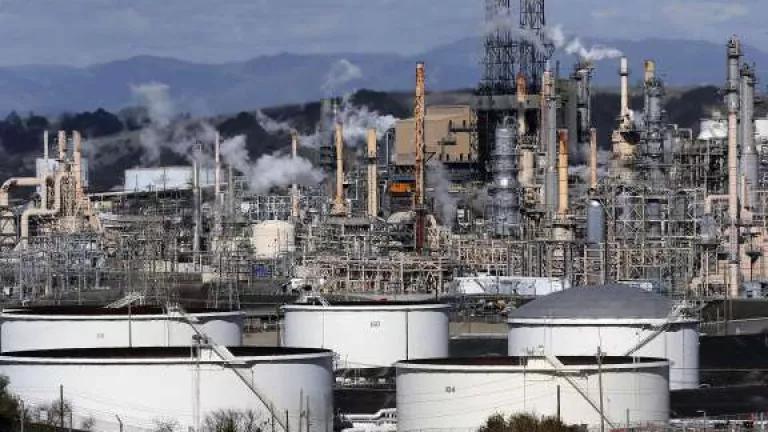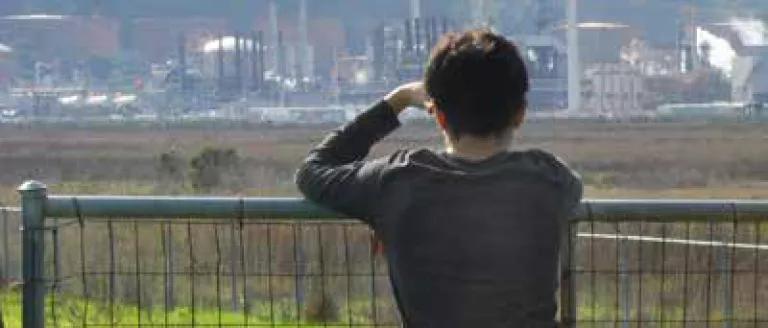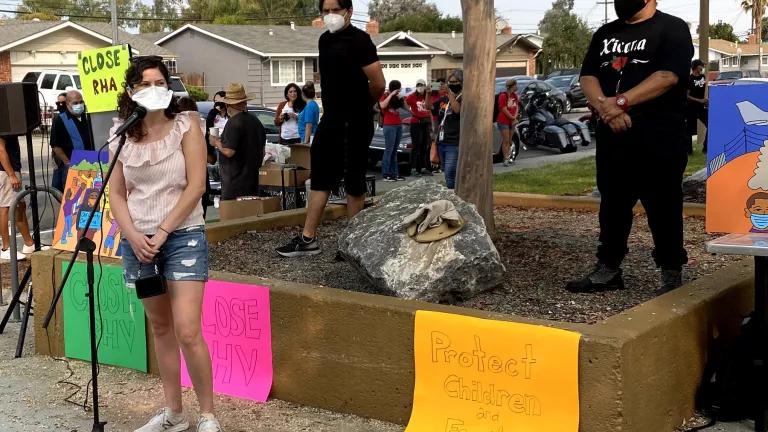Biofuel Conversions: A Chance to Model Just Transition
While decommissioning of crude refining is both necessary and inevitable as California state moves toward clean energy, there is a right way and a wrong way for a transition like that to happen.

Phillips 66 refinery, Rodeo
While California’s aging oil production industry has been in decline for awhile now, its oil refining sector appeared stable—until it wasn’t. This past summer, two refineries in Contra Costa County—the Phillips 66 refinery in Rodeo and the Marathon refinery in Martinez—announced that they were ceasing crude oil production and switching over to making biofuels.
One might imagine that those of us who are proponents of phasing out California’s dirty fossil fuels industry would be thrilled, but it’s not that simple. Some workers will lose their jobs, as biofuels production tends to require a smaller labor force. Idled portions of the site may be contaminated, and the environmental and community impacts of biofuels refining remains unclear.
While decommissioning of crude refining is both necessary and inevitable as our state moves toward clean energy, there is a right way and a wrong way for a transition like that to happen. What we know is that the transition away from coal—also inevitable and in process now—is in large part happening the wrong way. As the market turns away from coal in favor of increasingly cheaper and cleaner alternatives, towns and regions dependent on coal mining and combustion are abruptly finding themselves saddled with the triple whammy of mass unemployment, a crumbling tax base, and the environmental mess left behind by bankrupt coal barons.
The right way to transition—often referred to as a “just transition”—is what community and environmental advocates are encouraging Contra Costa County to pursue. In a letter signed by sixty organizations and sent today to the County Board of Supervisors, the organizations—including NRDC—encourage the County to treat the biofuels transitions as an opportunity to get ahead of the transition problem. The letter recognizes that the County is already fundamentally on the right track, having enacted in September a resolution declaring a climate emergency in the county and identifying, among other things, the need for the County to “anticipate and plan for an economy that is less dependent on fossil fuels,” and “plan for a ‘Just Transition’ away from a fossil-fuel dependent economy.”
The biofuels transitions and associated workforce downsizing not only have immediate impacts on the community that must be addressed, but should be understood as a potential prelude to complete closure of the refineries in the none-too-distant future. Contra Costa County supervisors, along with scores of other local officials around the state have signed the Diesel Free by ’33 pledge, which commits to a goal of reducing diesel emissions to zero by 2033. It’s a pretty good indicator that the long-term future of diesel production is may not be bright.
Accordingly, the letter specifically encourages County officials to use their permitting authority to require Phillips 66 and Marathon to address the impact of converting to biofuels on the community. It further encourages the County both to use its own legislative authority to establish financial accountability requirements (sometimes called “risk bonds”) to ensure that risks of operation and decommissioning of the refineries don’t fall on taxpayers; and to actively encourage the State to legislate for a just transition.
Underlying these asks is the fact that Phillips 66 and Marathon will benefit heavily from available subsidies for biofuels production. The County is in a position to ensure that the refineries, as the beneficiaries of the taxpaying public’s largesse, do not leave the public holding the bag for their operation and decommissioning costs.
Examples are already emerging around us of how transitions away from dirty energy can be done in a manner that protects workers and communities. Last year, Colorado Governor Jared Polis signed into law House Bill 19-1314, which established a just transition advisory committee that includes representatives of communities, labor, utilities, and relevant state agencies tasked with developing a statewide strategy (now out in draft) to transition the state away from coal that would “invest new financial resources in coal communities that are seeking to diversify and grow their local and regional economies in a manner that is both sustainable and equitable.” And here in California, environmental and labor groups reached a comprehensive agreement, approved by the legislature, for a just transition for workers and the community affected by the closure of the Diablo Canyon Nuclear Plant.

What’s important to bear in mind in addressing announcement of the refinery biofuels transitions is that they should not have been a complete surprise, and are almost certainly not a one-off event. Refinery profit margins have been in decline as crude oil demand decreases, so it was not a particularly shocking development that the volatility in the oil market caused by the COVID-19 pandemic pushed some refineries over the edge. It is reasonable to expect that other refineries will cease to process crude in the coming days as well—and the market will not support all of them converting to biofuels production.
Moreover, as explained in a report by Communities for a Better Environment and consultant Greg Karras last spring, decommissioning of crude refining needs to be a part of California’s climate policy, complementing its many strong demand-side initiatives such as the Governor’s recent executive order requiring that all passenger vehicles sold here be zero emission by 2035. As CBE points out in the report and elsewhere, refineries are not only very heavy emitters of greenhouse gases, but have to a degree sheltered themselves from the effect of demand reduction in California by increasingly exporting their refined products out of state.
The fact that California is at the very beginning of the likely wave of crude refinery decommissioning puts us in a decent position to plan for it. And Contra Costa County, where that wave is beginning, is ideally positioned to develop a blueprint for responsible transition that other communities can look to in the future.




